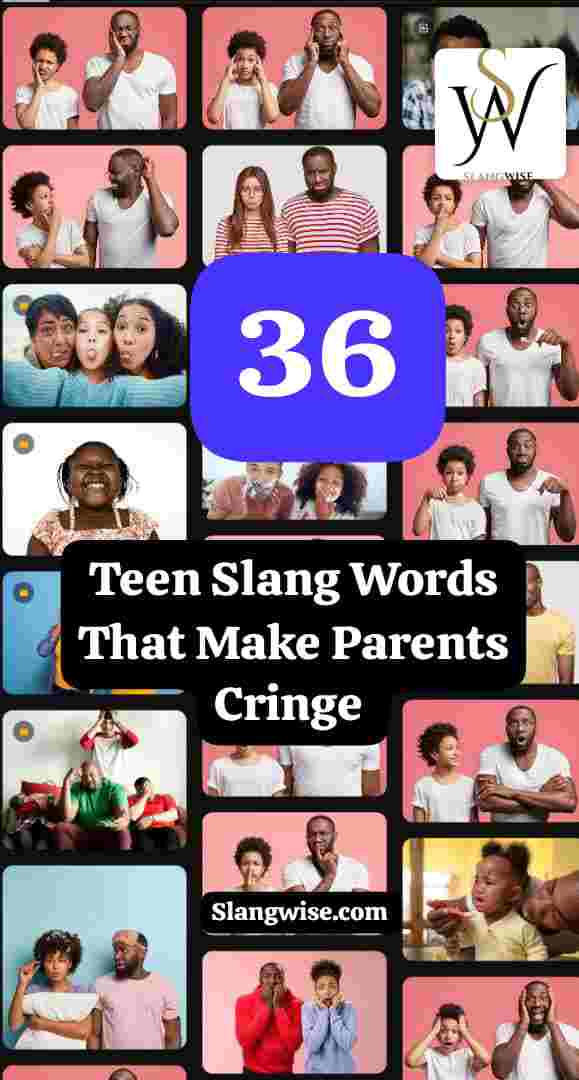Updated: 25/12/2025
Have you ever found yourself mid-conversation with your teen when they suddenly drop a word like rizz or no cap and you’re left staring like 🧐? You nod along, pretending you’re hip to the lingo, but inside you’re screaming, “Is this even English?!”
Welcome to the wild world of Gen Alpha slang, a linguistic rollercoaster where fire isn’t something you put out, sus isn’t short for Susan, and slay has nothing to do with dragons.
Actually, every generation invents its own secret code (remember groovy or talk to the hand?), but today’s teen slang evolves faster than a TikTok trend.
Whether you’re baffled by gyatt or cringing at sigma, this post is your decoder ring. We’ve rounded up 36 teen slangs that’ll make you side-eye your kid’s vocabulary, and maybe even laugh at how hard you’re trying to keep up.
Table of Contents
In a Nutshell
- The 36 Teen Slangs Words are: No Cap, Bet3, Thirsty, Rizz, Slay, It’s Giving, Sus, Flex, Ghosted, Glow Up, Snack, Vibe Check, Mood, Boujee, Receipts, W/L, Bussin’, Shook, Lowkey, Extra, Stan, Periodt, Simp, Main Character Energy, FOMO, Dead, Cheugy, Zaddy, Drip, Skrrt, Bae, Hits Different, Touch Grass, Tea, Yeet, GOAT.
- It’s Not That Deep: Slang is about identity and belonging, not rebellion. Teens use it to bond with peers, not to alienate you (even if it feels that way).
- Don’t Force It: Nothing kills a vibe faster than a parent yelling, “That’s so lit, fam!” Use slang sparingly… or just don’t. 😬
- Ask, Don’t Assume: Curiosity beats criticism. Instead of eye-rolling, ask, “What does ‘OTP’ mean?” You might actually learn something (and bond over the absurdity).
- This Too Shall Pass: Remember “YOLO” and “on fleek”? Today’s cringey terms will fade faster than your 2008 Facebook posts.
- Embrace the Cringe: Laugh with them, not at them. A little humor (“Wait, ‘cheugy’ is me, isn’t it?”) goes a long way.
Slangwise Thought on Teens Slang
Language is a living tool teens use to claim identity and community. Rather than policing every word focus on the feelings behind them. If a phrase signals exclusion or harassment deal with the behavior, not only the vocabulary.
Linguists track these shifts as typical of fast moving social networks where brevity and novelty spread quickly. New words often start as niche markers and either fade or become mainstream depending on use. Understanding that change helps parents respond calmly.
Ready to dive into the list? Buckle up, it’s about to get extra. 😉
36 Teen Slangs Terms That make Parents Cringe
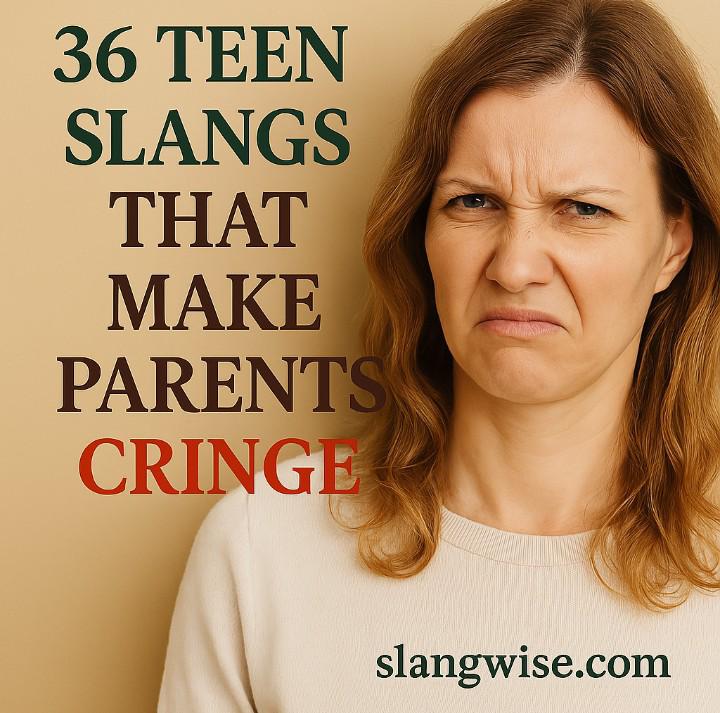
1. No Cap
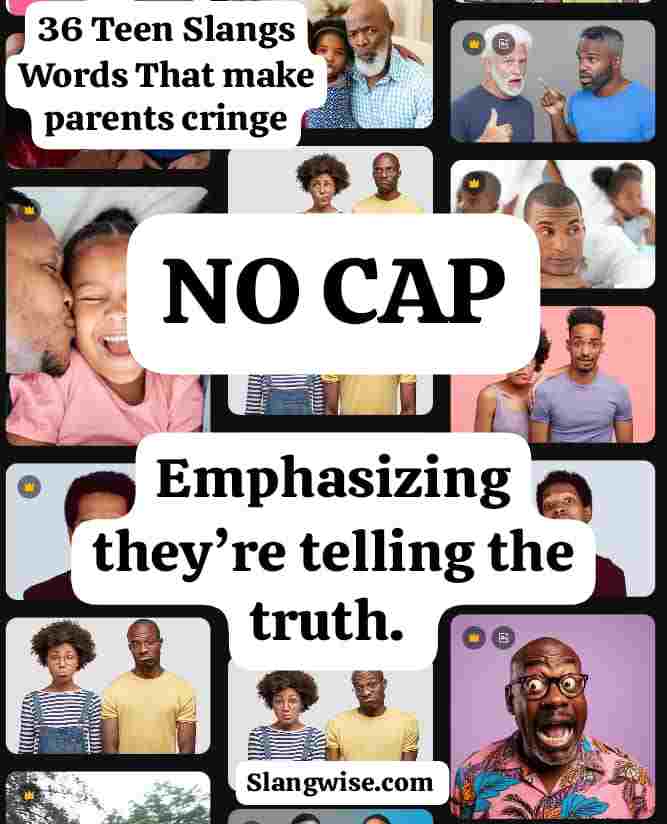
When teens say no cap, they’re emphasizing they’re telling the truth, like a modern-day pinky promise. Imagine your kid saying, “That concert was fire, no cap!” while you’re mentally Googling why “cap” means lying.
It originated from African American Vernacular English (AAVE) and blew up on TikTok, where capping became slang for exaggerating. Parents cringe because it sounds like a hat reference, but linguists love how it repurposes everyday words.
2. Bet
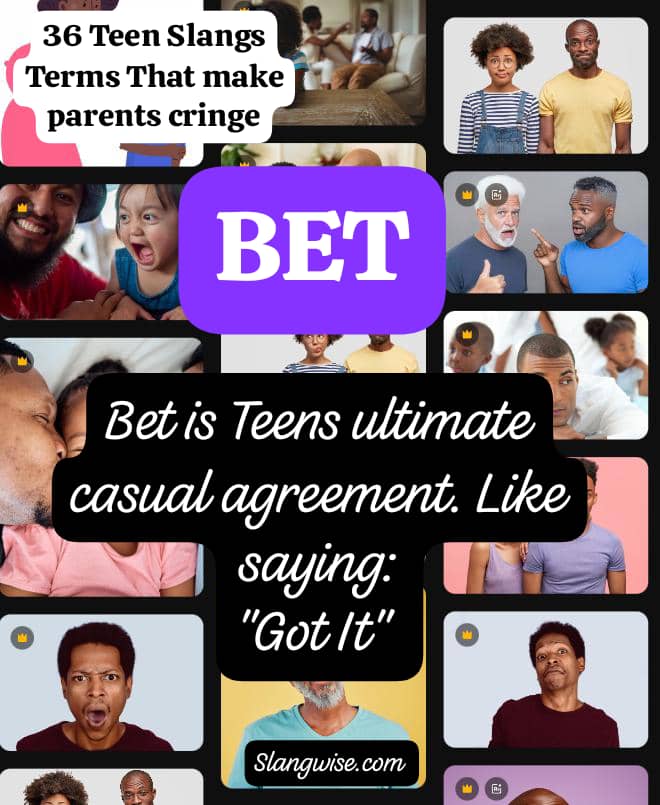
Bet is the ultimate casual agreement. If your teen says, “Bet, I’ll clean my room,” they’re not challenging you to a wager, they’re saying, “Got it.” It’s shorthand for “You bet I will,” stripped down for efficiency.
Parents find it abrupt, but it’s part of a larger trend where teens truncate phrases (see also: “sus” for suspicious). It’s the linguistic equivalent of a thumbs-up emoji.
3. Thirsty
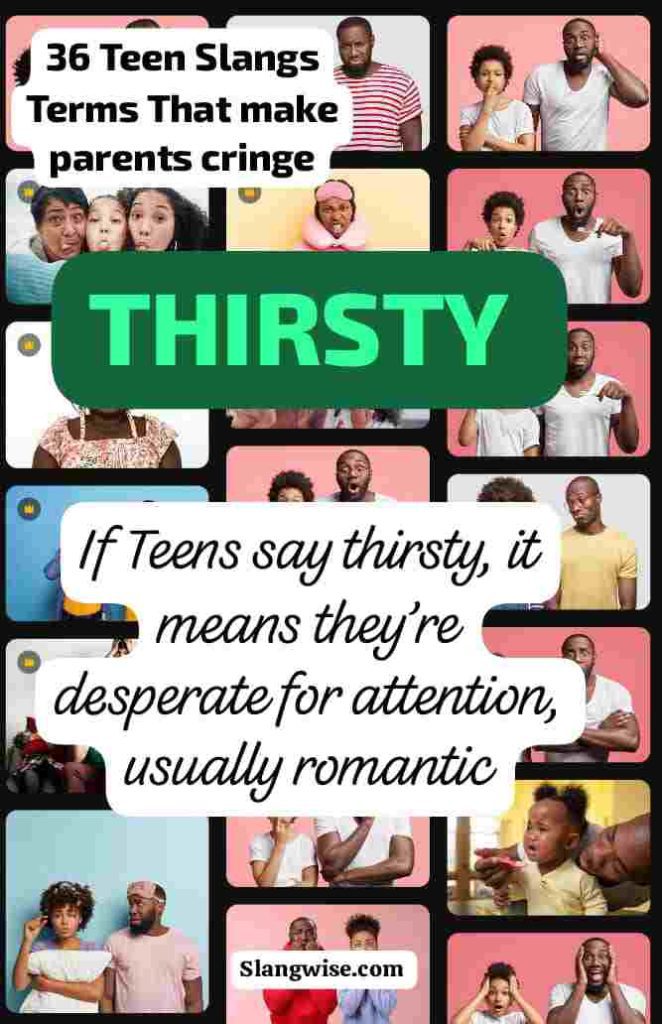
If someone’s “thirsty,” they’re desperate for attention, usually romantic. Picture your kid rolling their eyes: “He’s so thirsty, always sliding into her DMs.”
Parents might initially think, “Hydration is important!” but the term actually mocks overeager behavior. It’s been around since early 2000s hip-hop but resurged thanks to meme culture.
4. Rizz
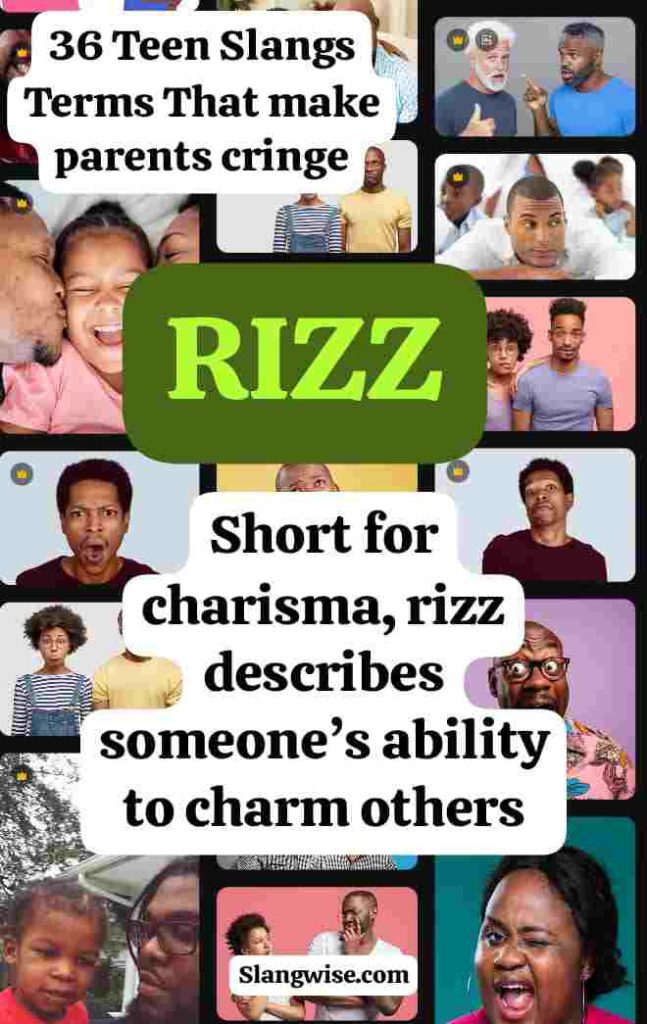
Short for “charisma,” rizz describes someone’s ability to charm others. Your teen might boast, “I’ve got rizz for days!” while you’re wondering if it’s a new energy drink.
The term went viral after YouTuber Kai Cenat popularized it, and it’s now a badge of honor in flirting.
Parents cringe at its abruptness, but it’s a brilliant example of how slang condenses complex ideas.
5. Slay
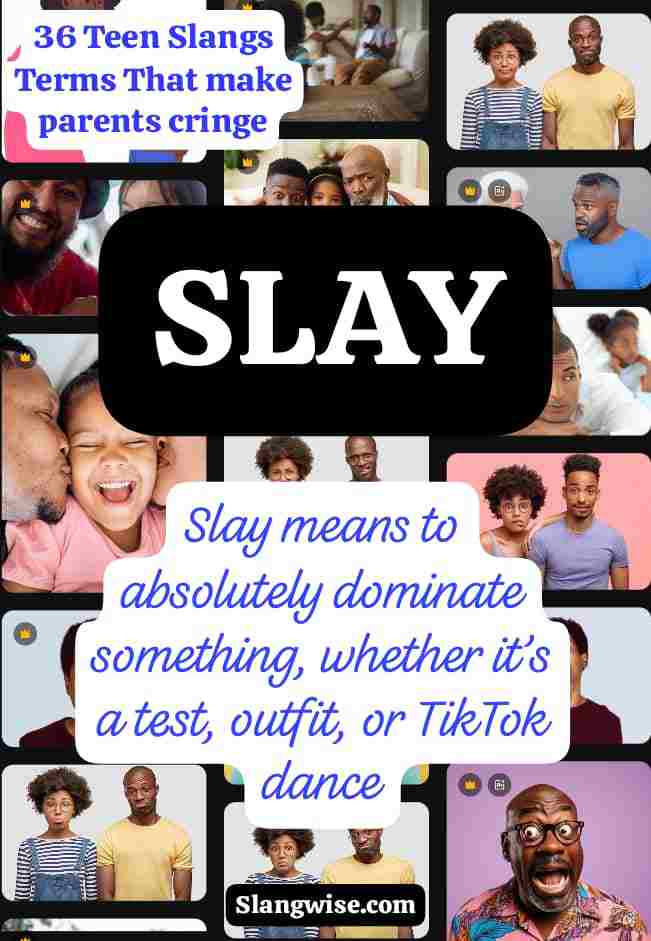
“Slay” means to absolutely dominate something, whether it’s a test, outfit, or TikTok dance. When your kid says, “Mom, you slayed that presentation!” it’s high praise.
Parents might associate it with medieval dragons, but its modern usage comes from ballroom culture and drag queens, where “slay” signifies excellence. It’s dramatic, yes, but also empowering.
6. It’s Giving
This phrase sets a vibe. “Your outfit’s giving 90s superhero” means it reminds them of that aesthetic. Parents might find it grammatically odd (“giving” what, exactly?), but it’s a creative way to link feelings to visuals.
It’s rooted in Black queer culture, where “reading” and “serving looks” are performance art forms.
Read Also: 200 Most Popular Internet Slangs of 2026: Level up your online game with the 200 most popular internet slang terms of 2025. Get fluent in the latest digital dialects and trends.
7. Sus
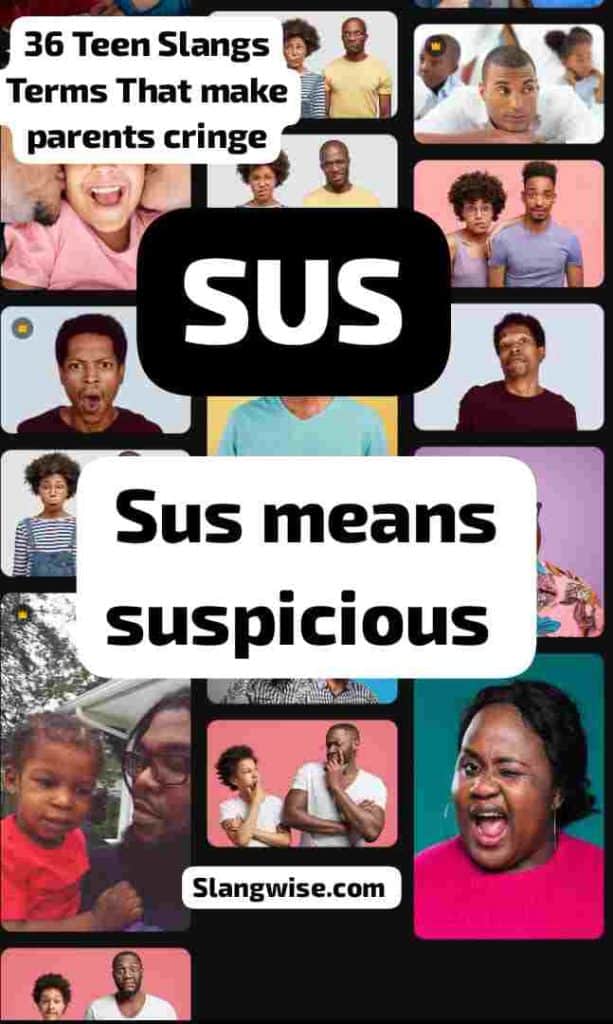
Short for “suspicious,” “sus” exploded with the game Among Us, where players root out deceitful teammates. Now, teens use it offline: “Dad’s sus for checking my phone twice.”
Parents might miss the gaming connection, but it’s a slick example of how niche terms enter mainstream vocab.
8. Flex
To “flex” is to show off, whether it’s new sneakers or straight-A grades. If your teen says, “Stop flexing your paycheck,” they’re calling out boastful behavior.
The term comes from bodybuilding (flexing muscles) but morphed into broader use. Parents cringe at its braggadocious tone, but it’s a natural human impulse repackaged.
9. Ghosted
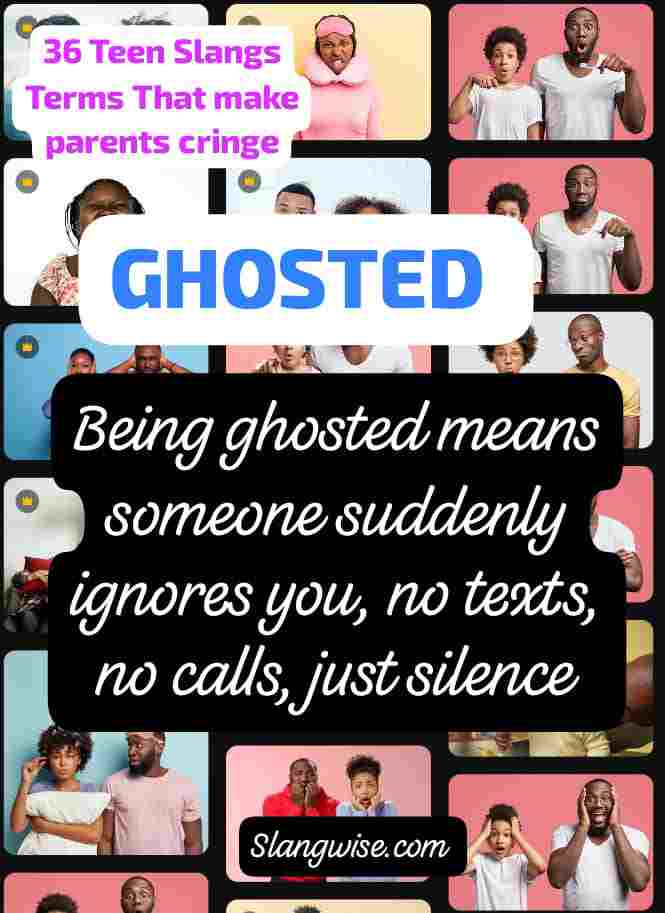
Being “ghosted” means someone suddenly ignores you, no texts, no calls, just silence. If your teen sighs, “She ghosted me after prom,” it’s a digital-age heartbreak parents might not relate to.
The term reflects how tech shapes modern relationships, where disappearing feels easier than confrontation.
10. Glow Up
A “glow up” is a transformation, think awkward middle schooler turning into a confident high schooler. “Did you see Emma’s glow up? She’s iconic!”
Parents might wonder why “glowing” is involved, but it’s a celebratory term for personal growth, often used with before-and-after social media posts.
11. Snack
Calling someone a “snack” means they’re attractive. “Zac Efron is a whole snack!” sounds odd to parents, but it’s a playful way to compare crush-worthy people to tasty treats.
It’s part of a foodie slang trend (see also: “thirst trap”) that turns appetite into metaphor.
Read Also: 35 Unique Military Slangs Every Civilian Should Know.
12. Vibe Check
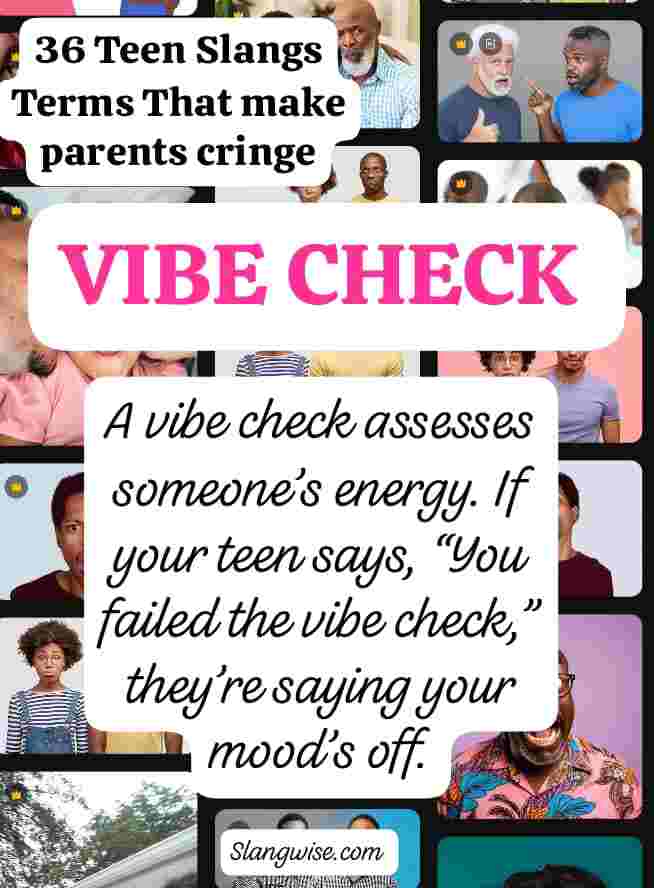
A “vibe check” assesses someone’s energy. If your teen says, “You failed the vibe check,” they’re saying your mood’s off.
Parents might take it personally, but it’s just Gen Z’s way of saying, “Read the room.” The term mirrors workplace “soft skills” training but with Gen Z flair.
13. Mood
When teens say “mood,” they’re relating to something deeply. A video of a cat napping might get a “This is a whole mood.” Parents hear melodrama, but it’s a shorthand for shared experiences, like how “same” became a meme.
14. Boujee
“Boujee” (from “bourgeois”) mocks people who act posh or materialistic. “She’s so boujee with her Starbucks orders” teases someone for splurging on lattes.
Parents might not grasp the class commentary, but it’s a critique of performative luxury.
15. Receipts
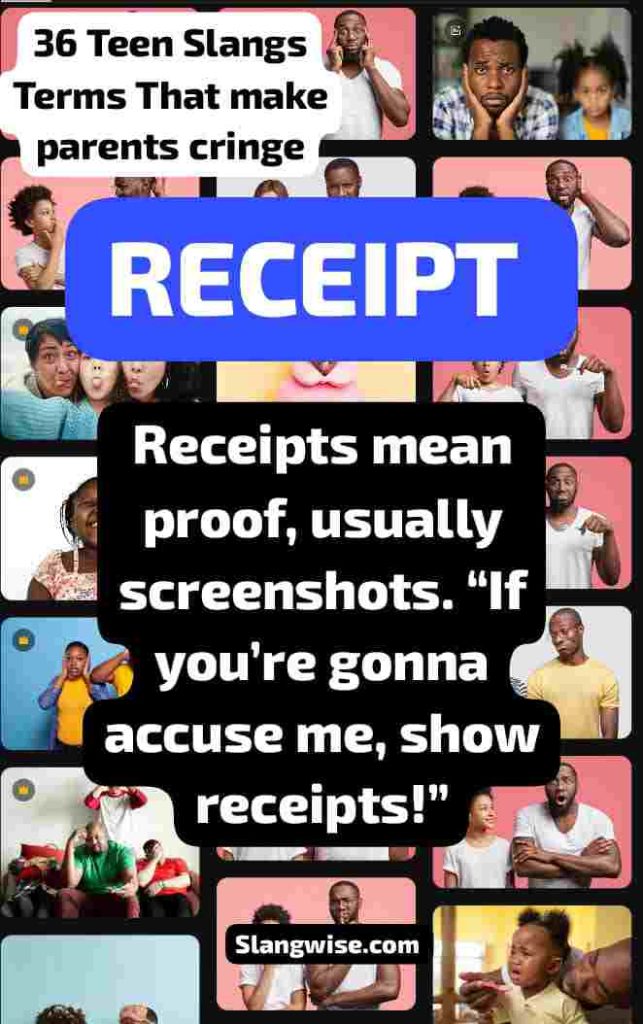
“Receipts” mean proof, usually screenshots. “If you’re gonna accuse me, show receipts!” Parents, used to paper trails, might miss the digital nuance. It’s a courtroom-worthy term repurposed for Instagram drama.
16. W/L
“W” means win; “L” means loss. “Getting into UCLA? Big W!” Parents hear alphabet soup, but it’s sports commentary adapted for daily life. It’s ruthlessly efficient, why say “That’s awesome” when “W” does the job?
17. Bussin’
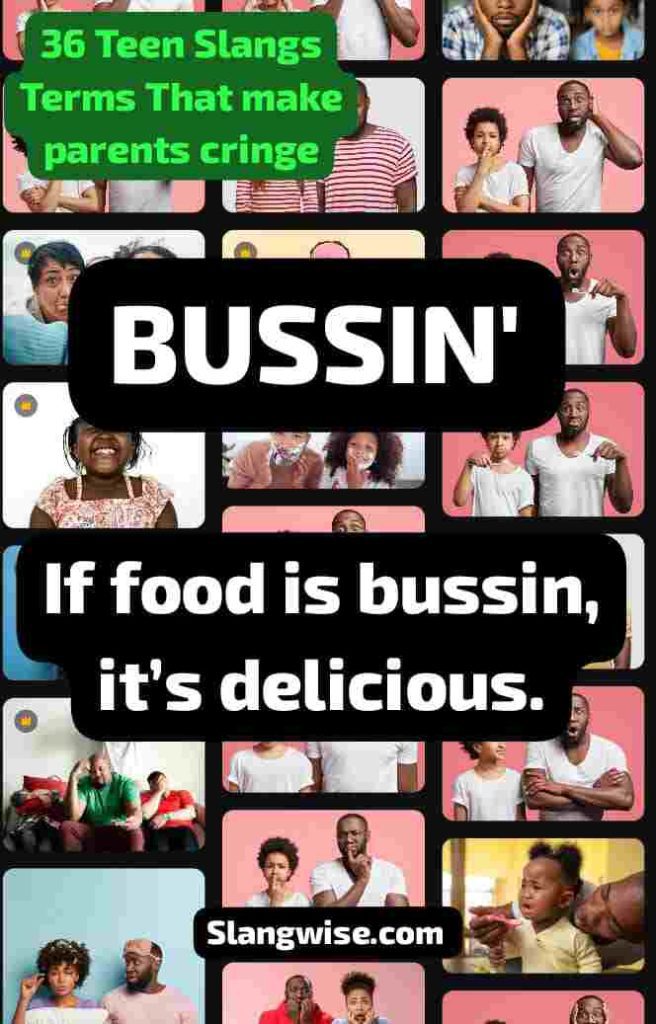
If food is “bussin’,” it’s delicious. “This mac ‘n’ cheese is bussin’!” might make parents ask, “Bussing where?” It’s AAVE turned mainstream, like “lit” or “fam.” The over-the-top delivery is part of the charm.
18. Shook
“Shook” means deeply shocked. “I’m shook, my crush actually texted back!” Parents might prefer “surprised,” but “shook” adds drama, borrowed from hip-hop (e.g., “I’m shook” in Mobb Deep’s Survival of the Fittest).
19. Lowkey
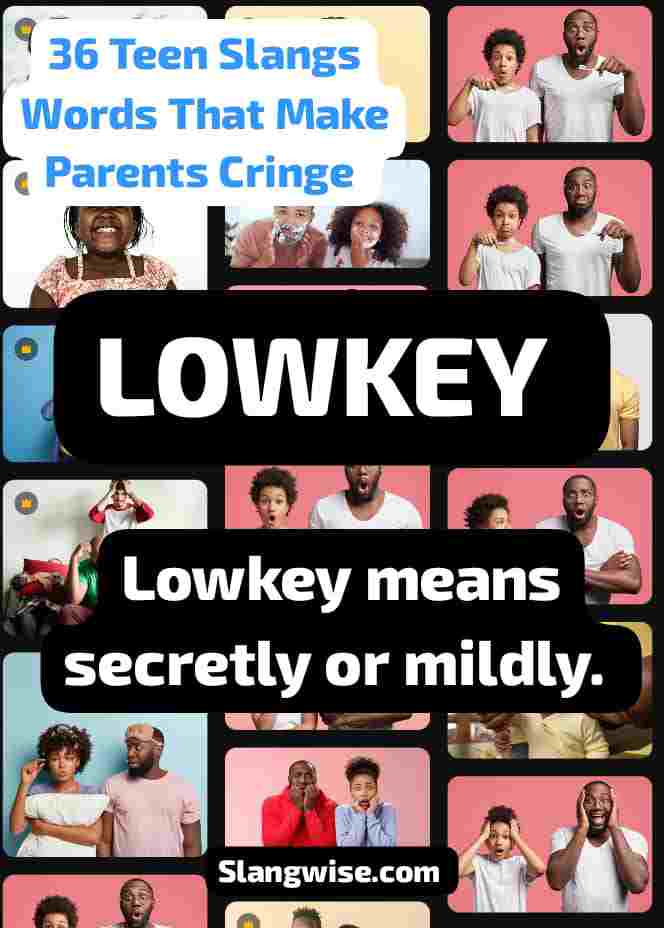
“Lowkey” means secretly or mildly. “I’m lowkey obsessed with Stranger Things” downplays enthusiasm. Parents hear redundancy, but it’s a way to share without overcommitting, a verbal shrug.
20. Extra
Calling someone “extra” means they’re over-the-top. “Why’s Mom so extra about curfew?” It’s a roast, but also a nod to Gen Z’s allergy to cringe. Parents might take offense, but it’s just honest feedback.
Read Aso:
21. Stan
To “stan” someone is to be their superfan. “I stan Taylor Swift!” comes from Eminem’s song Stan about an obsessive fan. Parents might worry about unhealthy fandom, but it’s usually harmless admiration.
22. Periodt
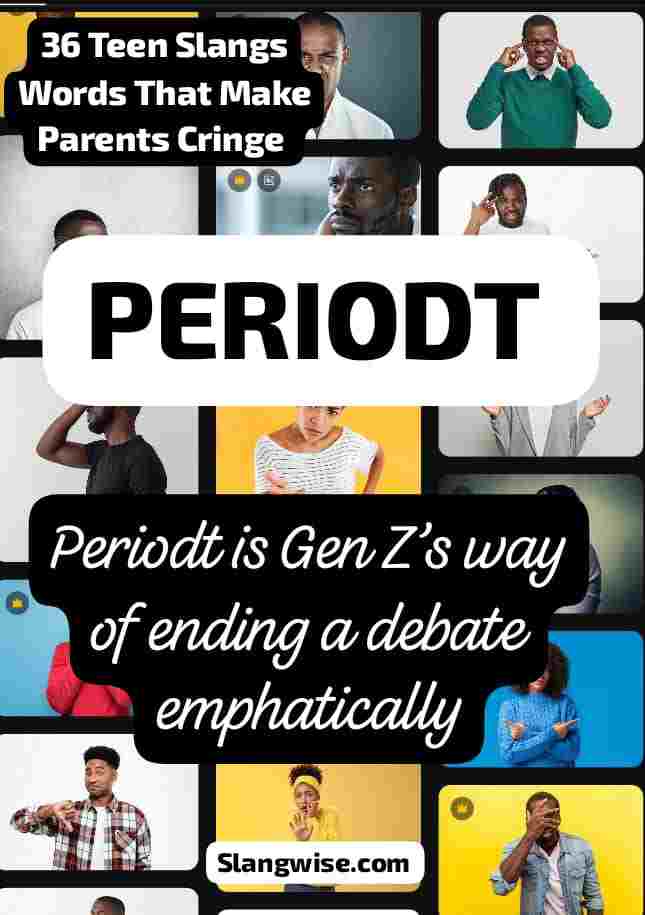
“Periodt” ends a debate emphatically. “We’re not arguing, periodt.” The added “t” is for stylistic flair, popularized by Black Twitter. Parents hear a typo; teens hear mic-drop energy.
23. Simp
A “simp” overdoes affection to impress someone. “He’s simping for her likes” mocks desperate behavior. Parents might dismiss it as rude, but it’s a critique of performative romance.
24. Main Character Energy
Someone with “main character energy” acts like life’s a movie. “She’s giving main character in that dress!” Parents might call it confidence, but it’s about owning your narrative, a Gen Z empowerment mantra.
25. FOMO
Fear Of Missing Out (FOMO) drives teens to overcommit. “I can’t stay home, FOMO!” Parents might shrug, but it’s a real anxiety fueled by social media’s highlight reels.
26. Dead
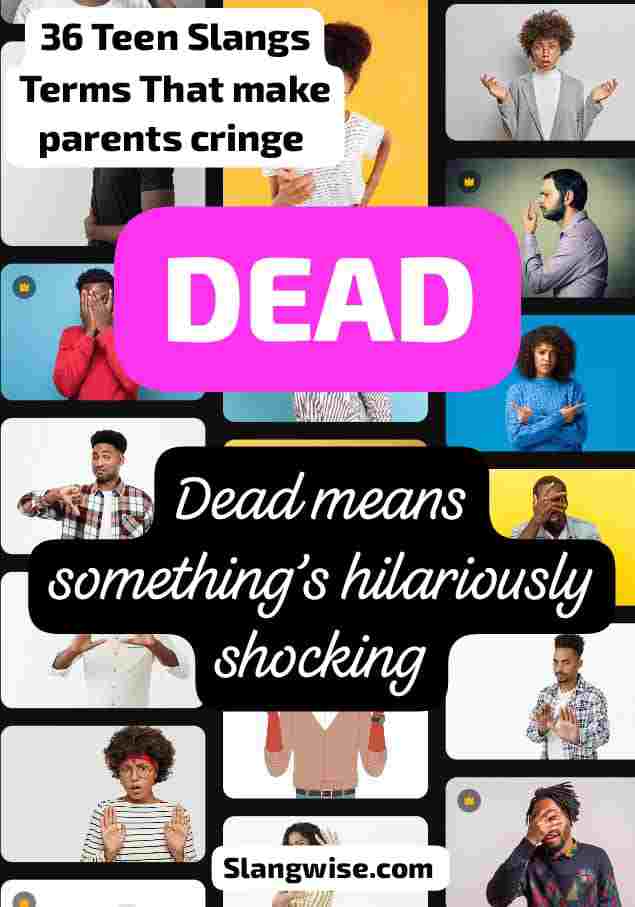
“Dead” means something’s hilariously shocking. “That meme killed me, I’m dead!” Parents hear morbidity; teens mean it’s laugh-out-loud funny.
27. Cheugy
“Cheugy” mocks outdated trends (e.g., pumpkin spice lattes). “Your side part is so cheugy” stings, but it’s Gen Z reclaiming cool. Parents, proceed with caution.
28. Zaddy
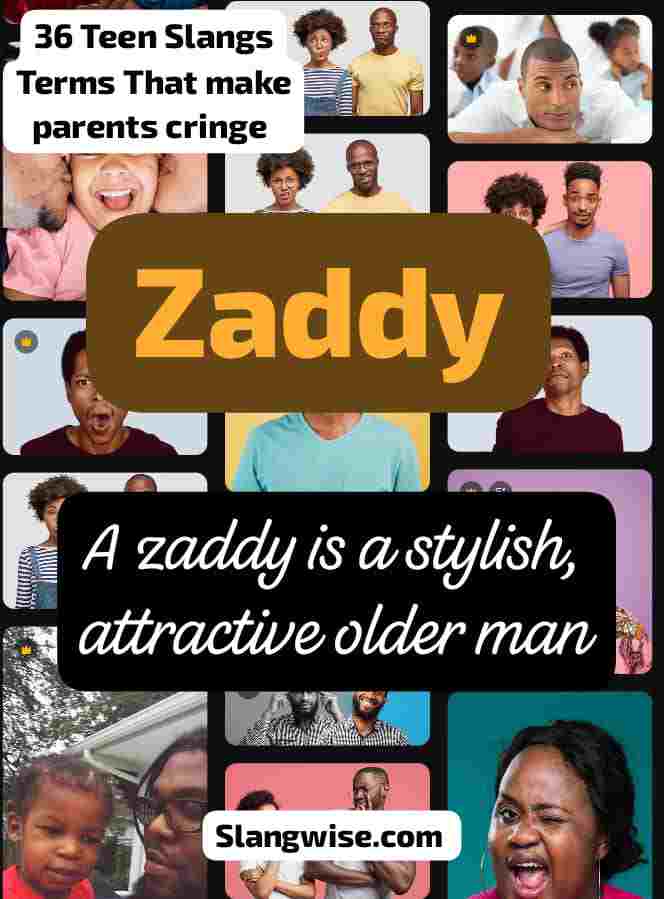
A “zaddy” is a stylish, attractive older man. “Pedro Pascal is zaddy goals!” Parents cringe at the flirtatious edge, but it’s a compliment—think “silver fox” with more swagger.
29. Drip
Drip refers to stylish clothing or overall appearance. Teens use it to compliment fashion sense. If a teen talks about drip, they are discussing style identity. Parents can use this as an opening to talk about self expression.
30. Ratioed
Ratioed is when replies or comments outnumber likes indicating disagreement or disapproval with a post. Teens use it mostly on social media to call out unpopular posts.
Parents should recognize this reflects online feedback loops and can hurt a teen who posts publicly.
31. TLDR
TLDR stands for too long did not read and is a shorthand summary or a request for a short version. Teens use it when content is long or to preface a brief conclusion.
Parents can use TLDR to ask for concise communication without judgment. For instance: TLDR, we are meeting at six.
32. Hits Different
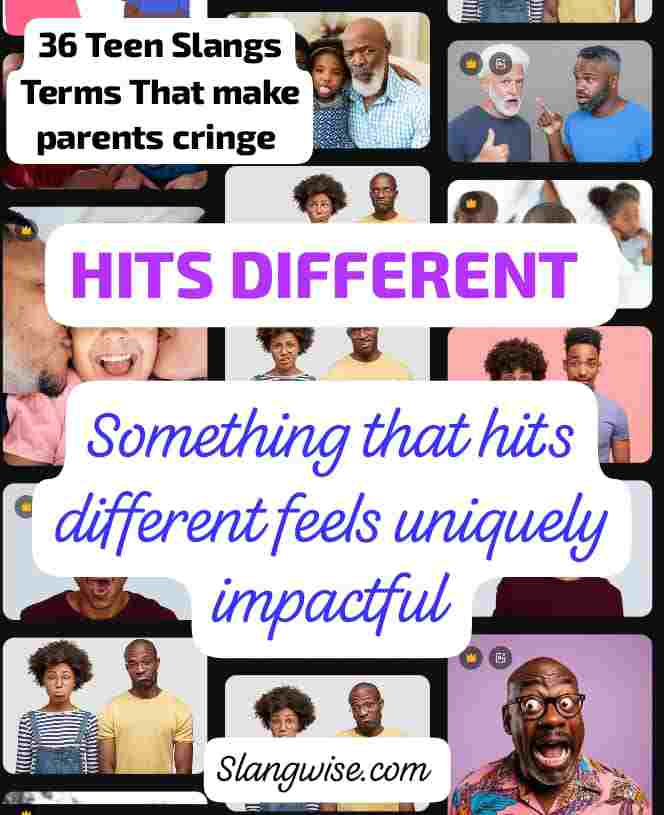
Something that “hits different” feels uniquely impactful. “It means something affects you more strongly than before often emotionally or nostalgically.
Teens say a song or memory hits different late at night or in certain moods. Parents can treat this as emotional sensitivity and a chance to connect.
33. Touch Grass
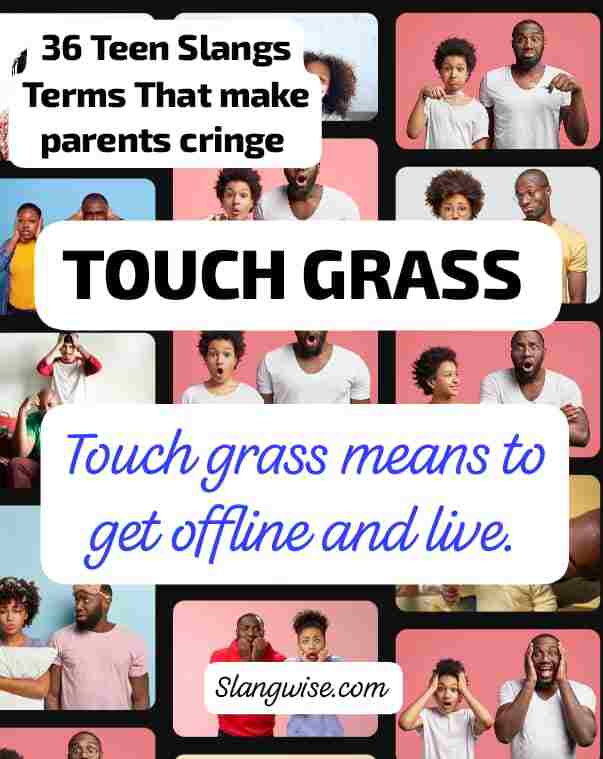
“Touch grass” means “get offline and live.” “You’re mad? Go touch grass.” Even parents agree on this one!
34. Tea/Spill the Tea
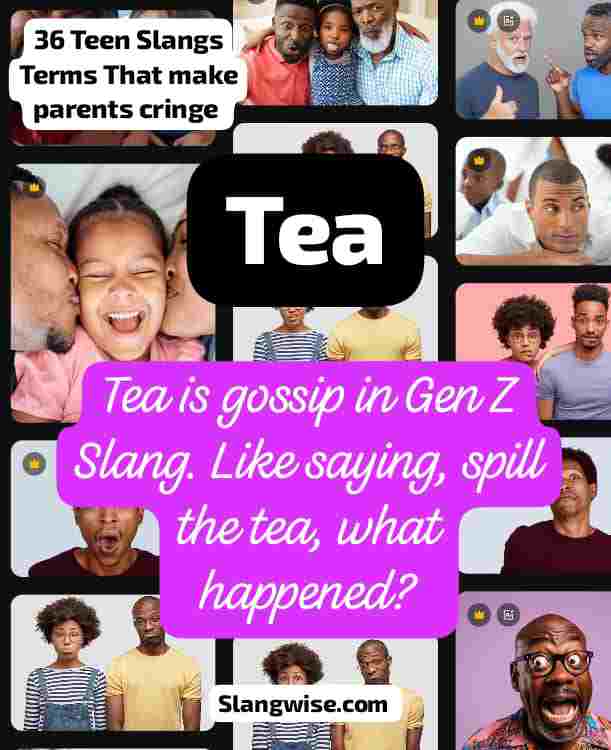
Tea refers to gossip or revealing the truth. Spill the tea means sharing details about a situation. Teens often use it playfully.
Parents should note whether the gossip is harmless or crossing into bullying or privacy concerns. For example, Spill the tea, why did everyone leave the group chat?”
35. Yeet
Yeet means to throw something with force or to express sudden excitement. Teens use it both literally and as an exclamation. Parents may hear it in sports or in chat when something surprising happens.
It is playful and not usually aggressive. For instance, “He got excited and yeeted his backpack onto the couch.”
36. GOAT
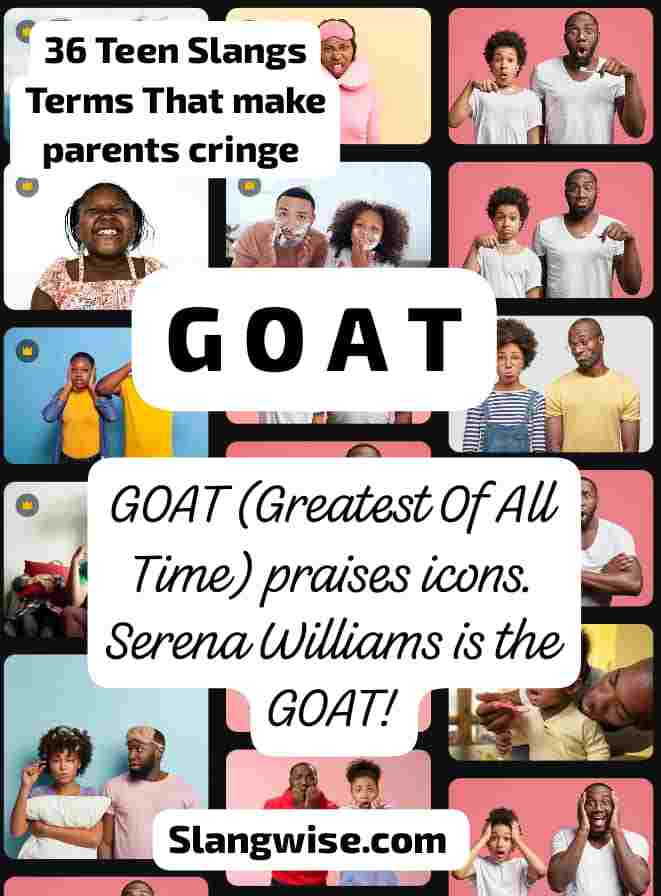
GOAT means Greatest Of All Time and is used to praise someone as the best in their field. Teens use it for athletes musicians or other admired figures.
For instance: That player is the GOAT, nobody comes close.” Parents can see it as strong approval rather than literal evaluation and a sign of fandom.
Quick parenting tips
- Ask meaning with curiosity not accusation. A simple “What does that mean?” invites explanation.
- Teach context and safety: slang itself is not harmful but context can be. Emphasize how to spot grooming, bullying, and unsafe sharing.
- Set clear rules for sharing personal information and images.
- Learn together. Turn slang decoding into a light way to connect without judgment.
Conclusion: Why This Matters
Slang isn’t just words, it’s identity. For teens, these terms build community and assert independence. For parents, decoding them is a bridge to understanding their world.
Sure, “rizz” and “cheugy” might sound silly, but they’re part of a rich linguistic tradition. Next time your kid calls something “sus,” laugh along, you’re witnessing language evolution in real time.
And who knows? Maybe you’ll drop a “no cap” and earn some street cred. lol

